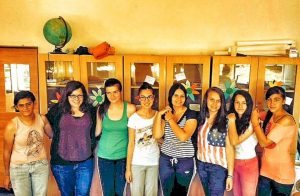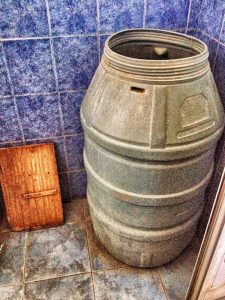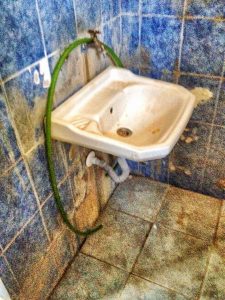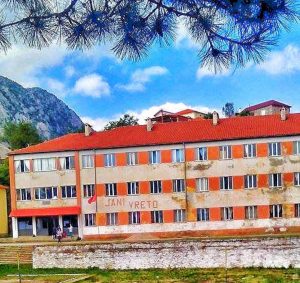This project is made possible through the partnership of Water Charity and the National Peace Corps Association. ![]()
This is a project under the LET GIRLS LEARN Program, a collaboration of First Lady Michelle Obama and the Peace Corps to expand access to education for adolescent girls around the world!
Location
Leskovik, Korca, Albania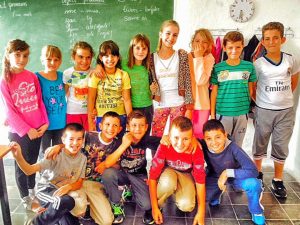
Community Description
Leskovik is a small town in southeastern Albania with just over 1,500 inhabitants. Due to the mountainous terrain and poor road conditions, Leskovik is quite isolated, with the nearest city being 2 hours away. During the Communist era, it was a city of certain military importance due to its close proximity to the Greek border, but the population has since fallen dramatically.
However, Leskovik is still known for its wine and music. The school is the largest source of employment in the town and surrounding villages with 30 teachers and staff. Jani Vreto is the only school building, with a total of 250 students in grades 1st-12th, approximately 120 girls and 130 boys.
Problem Addressed
The conditions of the school toilets present both safety and hygiene concerns for anyone using them, especially women and young girls. The restrooms in the school are in dire need of repair and replacement. Currently, there are two Turkish toilets for female students and staff, and two for male students and staff. There is no running water inside the school at all.
At the beginning of every week, large barrels are filled with water from the outside tap and one is placed in each restroom. With this water, students and faculty are expected to flush the toilets and wash their hands. Due to the height of these barrels, the younger students are unable to do 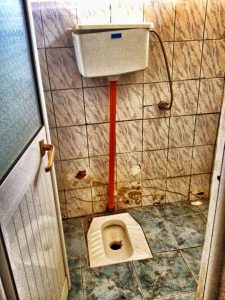 either. The stall doors cannot be secured; many are even unable to close.
either. The stall doors cannot be secured; many are even unable to close.
Project Description
This project will ensure that all four toilets are functioning and that both sinks are hooked up to water for the student body and faculty. It will involve replacing four Turkish toilets, two sinks and faucets, four aluminum doors that lock, as well as fixing the plumbing so that there is a direct connection to running water. This will also require the bathrooms be equipped with a water deposit to ensure students and faculty have access to clean water throughout the school day. This involves installing the deposit inside, as the climate is too cold during the winter months to be placed outdoors.
The local plumber, who is under a contract through the municipality, will do the skilled work. Cleanup will be completed by the school faculty and parents.
The municipality, along with parents, will provide the school with other necessities that are currently lacking (i.e. soap, hand towels, toilet paper, trash bins) as well as cover all labor and transportation costs.
After the construction has been completed, a group of teachers will begin designing lessons about hand washing and the importance of personal hygiene. Homeroom teachers will be responsible for conducting pre-arranged activities that show how quickly germs are spread and illustrate the importance of using soap instead of only water.
Project Impact
This project will impact 280 people directly, 250 students and 30 teachers and staff. The project also impacts guests to the school as well as future students.
Peace Corps Volunteer Directing Project
Stacey Weidemann
Monitoring and Maintenance
The municipality will maintain the facility with regular inspections. Community members and faculty will ensure that the restrooms are well stocked with essential materials.
Comments
Many girls miss several days of school each month due to the lack of a safe restroom equipped with running water. Regularly missing school due to unavoidable conditions may cause girls to stop attending school altogether. By addressing this problem, girls will no longer need to miss school because of menstruation. The inability to lock the stall doors poses safety concerns that affect all who use the restrooms but in particular women and girls.
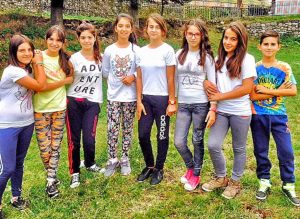 When PCV, Stacey Weidemann first discussed this project with other teachers, she was surprised by how much they had to say on the subject. There are no restrooms exclusively for faculty, but Stacey had never thought about how it affected the teachers. The physics teacher, who has been working at the school for over 30 years, said that she used the restroom once. She told Stacey she walks home now when she needs to relieve herself; she lives on the other side of town.
When PCV, Stacey Weidemann first discussed this project with other teachers, she was surprised by how much they had to say on the subject. There are no restrooms exclusively for faculty, but Stacey had never thought about how it affected the teachers. The physics teacher, who has been working at the school for over 30 years, said that she used the restroom once. She told Stacey she walks home now when she needs to relieve herself; she lives on the other side of town.
It’s easy to understand why faculty and students have avoided using the restrooms. Even though the toilets are at the end of the hallway, the stench from the restrooms fills up the entire first floor. By midday, it’s the first thing you notice upon entering the school.
This project is part of our Let Girls Learn Initiative, and its sub-program 100 Water Projects Program – Albania.
This project has been fully funded.
This project has been completed. To read about the conclusion, CLICK HERE.
